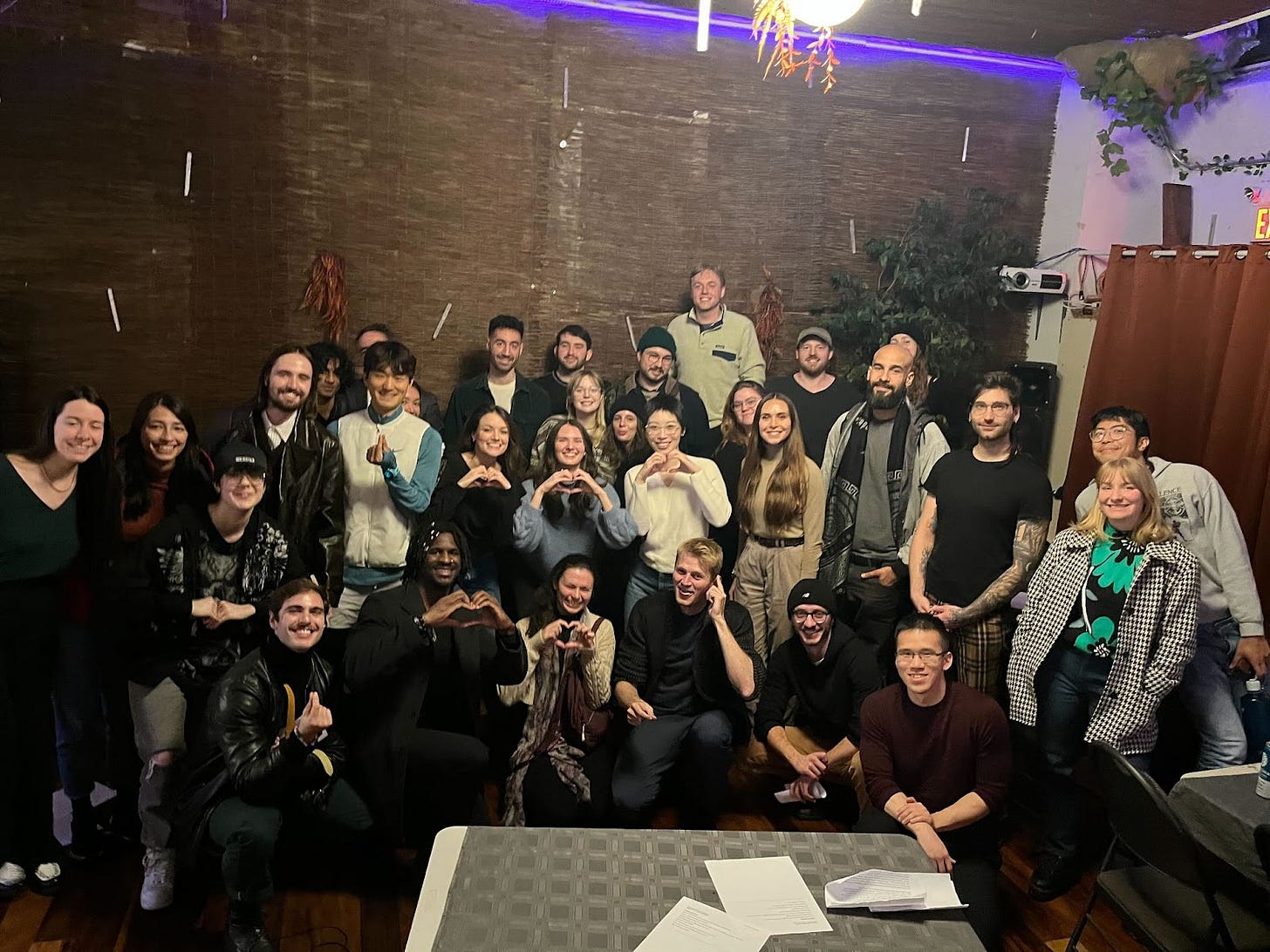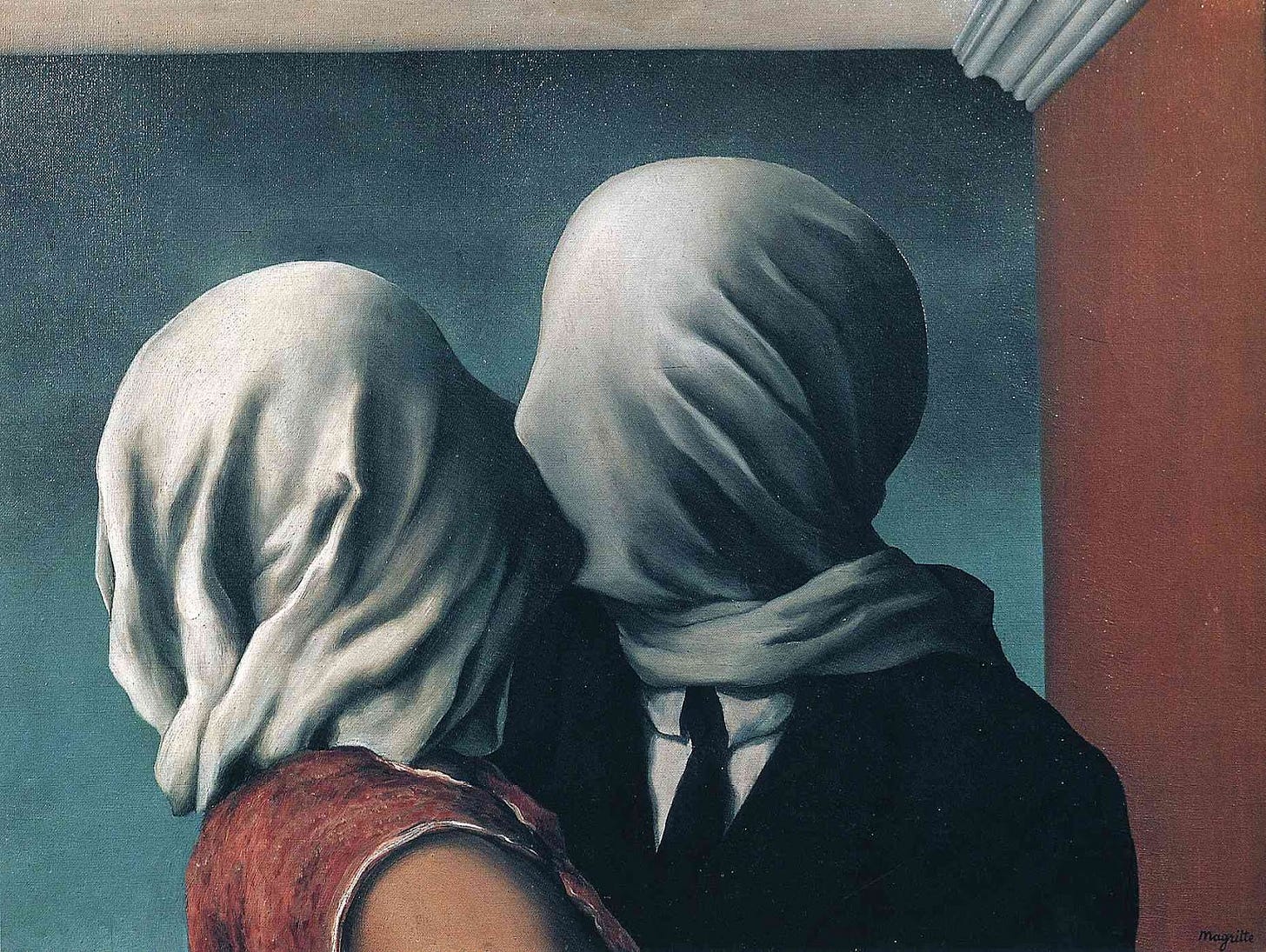Pictured: Attendees of our first Curiosity Café, “What is Love?”
Thank you to all those who came out and made our first event a grand success!
Featured Content:
Curiosity Café Recap: What is Love?
Our Next Café: What is Morality?
Arts & Culture: The Lovers by René Magritte
Toronto Events
Readings & Resources
Our First Event: What is Love?
By Adrian Ma
Last Thursday we held our first-ever event, a “Curiosity Café” on the nature of love. The turnout exceeded even the expectations of this very ambitious team. Minutes into the two-hour event, we had run entirely out of chairs and nearly out of cushions, and the room was bursting at the seams.
We are heartened by how many people came out for a lively, cordial, and sometimes provocative discussion on the nature of love. The turnout has reinforced our belief in one of the foundational tenets of Being and Becoming: that philosophy, far from being a purely academic subject, remains deeply relevant to contemporary life.
Thursday’s topic – love – is a case in point. As Heidi and Sophia, our two moderators, noted, there are stakes involved in the question of what love is. We want to know what we mean when we tell someone we love them, and vice-versa; relationships are healthier when the parties involved are on the same page. Failing to ask the question can lead to misunderstandings both of other people and of ourselves. Love, after all, is and will likely remain a dominant concern in our culture. We watch romantic films, invoke attachment theory and love languages, and look to horoscopes for guidance in our love lives. Anything that occupies such a prominent place in our culture is worth reflecting on and talking about together. And that is just what we did on Thursday.
Love is often considered the closest thing we have to a universal experience. But what emerged in our conversation on Thursday is the sheer variety of ideas, intuitions and experiences encompassed by that familiar label. (As the novelist Leo Tolstoy writes in Anna Karenina, “If there are as many minds as there are heads, then there are as many kinds of love as there are hearts” – although some of us on Thursday would have disputed love’s dependence on the heart.)
Some argued that love requires understanding, which may cast doubt on the notion of love at first sight or of love between humans and non-human animals. Some argued that it does not. We also considered the question of whether one can truly “know” another person at all, and whether love is possible with only a partial understanding of the beloved.
We discussed the dominant view of love as involving a merging of individual identities, and the potential of this view to promote dangerous forms of dependence or self-annihilation. We asked whether the same concept of love applies in all the different cases in which we use the word (“I love my dog,” “I love my mom,” “I love coffee,” “I love wisdom”) or whether different concepts are in play beneath the linguistic surface.
Chances are, we didn’t end the night in agreement on what love is. That was (we’ll have you know) part of the plan. Our moderator Heidi has even said that the ideal conclusion to such a discussion is a state of “aporia,” or a state of puzzlement or doubt caused by the absence of a clear solution. But what we hope we all agreed on is the joy and the importance of discussing such questions together, and their relevance to everyday life.
Again, we want to extend a heartfelt thanks to everyone who came to lend their support. We couldn’t have done it without you, and we hope you’ll join us again.
Our Next Café
We will be hosting our second Curiosity Café in two weeks. The topic of our next café is:
Morality. Is it a matter of fact, or just a matter of opinion? What do we mean when we say "right" and "wrong," "good" and "bad"? Are moral emotions reliable? Where does our sense of morality come from?
PS: We believe that all topics are worthy of discussion at our events. However, some topics are sensitive and need to be handled with greater care. If you don't see your chosen topic here, don't worry. We just need a bit more time to adequately prepare for a productive, lively, and stimulating discussion.
If you have any topics you’d like to explore, or suggestions for how the café could be improved, please let us know by replying directly to this email or sending us a message on Instagram.
Arts & Culture
By Jasmine Tremblay D’Ettorre
Art Highlight: René Magritte, “The Lovers” (1928)
Our highlighted photo for this newsletter is René Magritte’s “The Lovers.” The MoMA describes this painting as an “unsettling image [that] invokes the cinematic cliché of a close-up kiss but subverts our voyeuristic pleasure by shrouding the faces in cloth. The device of a draped cloth or veil to conceal a figure’s identity corresponds to a larger Surrealist interest in masks, disguises, and what lies beyond or beneath visible surfaces.” (René Magritte. The Lovers. Paris 1928 | MoMA)
This description brings up some interesting questions about intimacy and love. One might look at this image and find it beautiful, confusing, or maybe—unsettling. When we think about love, do we think about it as something that “lies beyond or beneath visible surfaces?” Or, do we view it as something open, obvious, and loud? When I first looked at this image, I found it comforting. It reminded me of the visuals we saw during the pandemic of couples embracing while wearing masks. Even amidst physical barriers, we seek out intimacy and connection with others, especially those we love.
Yet, the description brings up an important point about how we consume cultural images of love and intimacy. Is this consumption often voyeuristic? How might our collective yearning for connection, and our curiosity for how others find this in the world, bear on how we seek this out?
Toronto Events
*Note: All posted events are free or PWYC.*
AGO: Library & Archives Unshelved: Multiverse of Multiples (FREE)
Description: “This drop-in series, hosted by AGO librarians and archivists, gives visitors a first-hand glimpse of highlights from the Edward P. Taylor Library & Archives collection. In this installment, Reference Librarian Donald Rance will mine the vaults for a selection of multiples by artists including Marcel Duchamp, Jon Sasaki, David Shrigley, Jenny Holzer, and many more. Please visit the Marvin Gelber Print & Drawing Study Centre at any point between 6 to 8 pm to enjoy a personalized encounter with this collection.”
Location: Marvin Gelber Print & Drawing Study Centre, Art Gallery of Ontario
Date & Time: November 29th, 6:00-8:00 PM
Link: https://ago.ca/events/library-archives-unshelved-multiverse-multiples
Bampot Philosophy Cafe Event
Description: If you liked attending our philosophy cafe event, check out another one that happens in the city every Wednesday! Drinks, discussions, and snacks available!
Location: Bampot Cafe
Date & Time: Every Wednesday from 8:00 p.m to 12:00 a.m.
Link: @philonightto (instagram)
Ageless International Film Festival (PWYC)
Description: Ageless is a not-for-profit International Film Fesitval aimed at raising awareness around aging and ageism. It “celebrates the sweet and the better aspects of living longer and living wiser.”
Location: Innis Town Hall Theatre, TIFF Lightbox, etc.
Date & Time: Many events from October 11, 29, November 1-7, and 12.
Readings and Resources
*Note: All readings are publicly available with links attached. Readings are meant to exemplify what our team has found exceptionally interesting recently.”
Mahmoud Darwish. Unfortunately, It Was Paradise: Selected Poems. Translated and edited by Munir Akash and Carolyn Forché (2003)
Mahmoud Darwish was a prominent Palestinian Poet known for his ‘poetry of resistance.’ This collection of his poems traces his work on love, otherness, identity, resistance, and collective memory.
Brendan DeKenessey. “Depression and the Good.” Blog of the APA (2023)
In this public philosophy article, Brendan DeKenessey (University of Toronto) considers how philosophy bears on the topic of depression. In a touching article that details his own experiences with depression, DeKenessey captures a snapshot of what depression can feel like, and how value can feel comparative, or elusive in cases of depression. He offers some promising conclusions on how philosophy can help show us ‘the way out.’
Jack Maden. “Friedrich Nietzsche’s Life, Insanity, and Legacy.” Philosophy Break (2023)
In this essay, Jack Madden explores Nietzche’s life and legacy. If you have ever been curious about this philosopher’s history, and how his mental and physical health conditions, faith, and academic affiliations beared on his work — this is the article for you!
Friedrich Nietzsche’s Life, Insanity, and Legacy | Philosophy Break
Michael Vazques and Michael Madden Prinzing. “The Virtues of Ethics Bowl: Do pre-college philosophy programs prepare students for democratic citizenship?” Journal of Philosophy in Schools 10, no. 1 (2023): 25-25. doi: 10.46707/jps.v10i1.181.
Abstract: “This paper discusses the rationale for, and efforts to quantify the success of, philosophy outreach efforts at the University of North Carolina at Chapel Hill, with a focus on the National High School Ethics Bowl (NHSEB). We explore the program's democratic foundations and its potential to promote civic and intellectual virtues. After describing pioneering efforts to empirically access the impact of NHSEB, we offer recommendations to empower publicly and empirically-engaged philosophers to conduct further studies in the future.”
Featured Quote
“Love is the extremely difficult realisation that something other than oneself is real.” – Iris Murdoch
Our mission is to present a diversity of perspectives and views. The views and opinions expressed in this newsletter are solely those of the individual authors and do not necessarily reflect the views or opinions of Being and Becoming. Being and Becoming disclaims any responsibility for the content and opinions presented in the newsletter, as they are the exclusive responsibility of the respective authors. If you disagree with any of those presented herein, and you feel so inclined, we recommend reaching out to the original author and asking them how they came to hold that opinion. It’s a great conversation starter.





